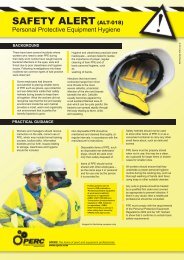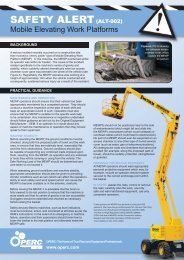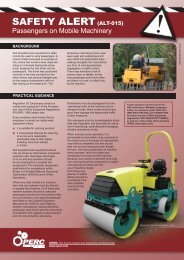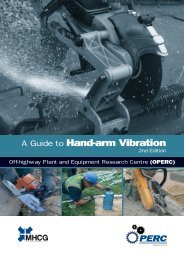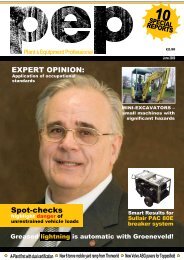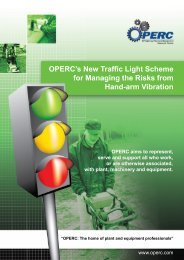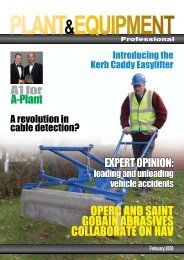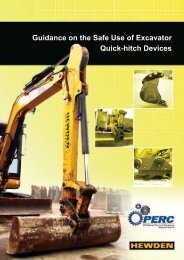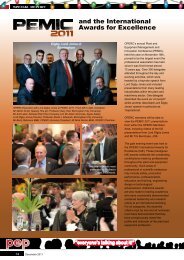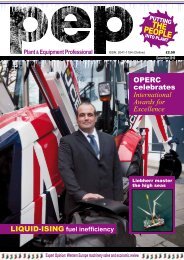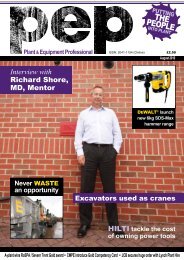the PeoPle - OPERC - Off-highway Plant and Equipment Research ...
the PeoPle - OPERC - Off-highway Plant and Equipment Research ...
the PeoPle - OPERC - Off-highway Plant and Equipment Research ...
You also want an ePaper? Increase the reach of your titles
YUMPU automatically turns print PDFs into web optimized ePapers that Google loves.
1<br />
case studies<br />
To illustrate how <strong>the</strong> human factors<br />
discussed can impact upon behavioural<br />
safety, six short case studies are shown<br />
here. They provide brief snapshots of<br />
typical mistakes, omissions <strong>and</strong> errors<br />
that occur across <strong>the</strong> incident causal<br />
supply chain <strong>and</strong> could have resulted<br />
in serious fatality or injury. The human<br />
factors involved could belong to <strong>the</strong> job,<br />
individual or organisation <strong>and</strong> in some<br />
instances a combination is in operation.<br />
Defect reporting,<br />
Birmingham, 2011<br />
The Job - A crane operator<br />
diligently reported defects prior to an<br />
assessment. He explained that although<br />
<strong>the</strong> defects were reported daily he<br />
doubted that action would be taken – an<br />
indication of apathy towards machinery<br />
maintenance on this particular job.<br />
The Individual - The operator was<br />
a long st<strong>and</strong>ing employee within a<br />
scrap metal company. He had an<br />
excellent work ethic <strong>and</strong> was keen to<br />
make everything as safe as possible.<br />
The Organisation - Although <strong>the</strong><br />
company had a multi-million (£) annual<br />
turnover, main equipment items in<br />
use were in need of major inspection<br />
<strong>and</strong> repair. The company’s Health <strong>and</strong><br />
Safety <strong>Off</strong>icer was totally out of touch<br />
with <strong>the</strong> practical application of <strong>the</strong><br />
equipment <strong>and</strong> seemed reticent about<br />
making <strong>the</strong> decision to improve <strong>the</strong><br />
safety of machinery on site. There was<br />
suggestion that senior management<br />
would not welcome <strong>the</strong> additional<br />
spending on machinery maintenance.<br />
2<br />
3<br />
Unloading tracked dumper,<br />
Manchester, 2011<br />
The Job - A tracked crawler dumper was delivered to site. The<br />
image shows <strong>the</strong> operator stood in an extremely dangerous<br />
position, a position from which he started <strong>the</strong> dumper <strong>and</strong> <strong>the</strong>n<br />
pushed <strong>the</strong> tiller bars to unload. The unloading activities were not<br />
being managed on site.<br />
The Individual - The plant transporter driver held no certification<br />
o<strong>the</strong>r than a generic site dumper certificate of competence from<br />
a national body <strong>and</strong> clearly did not recognise, or chose to ignore,<br />
<strong>the</strong> inherent danger of<br />
this activity.<br />
The Organisation -<br />
Site management were<br />
blissfully unaware of <strong>the</strong><br />
driver’s incompetence<br />
<strong>and</strong> <strong>the</strong> dangerous<br />
occurrence that had<br />
occurred. No action was<br />
taken to address this<br />
observed incident.<br />
ROPS utilisation, Cannock, 2009<br />
The Job - A relatively straightforward work task involved<br />
moving topsoil for general l<strong>and</strong>scaping purposes, operating on a<br />
firm temporary road surface.<br />
The Individual - The operator did not hold any formal training<br />
certificate <strong>and</strong> failed to recognise <strong>the</strong> danger of not securing<br />
<strong>the</strong> roll-over protective structures (ROPS) frame into <strong>the</strong> correct<br />
position or of wearing a seat belt. He considered such activities<br />
to take time that he didn’t<br />
have <strong>and</strong> questioned why<br />
he should bo<strong>the</strong>r as he had<br />
never had an accident <strong>and</strong><br />
had operated plant for years!<br />
The Organisation - A high<br />
profile major contractor<br />
remained ambivalent about<br />
this sub contractor’s bad<br />
operational practice. On this<br />
particular job site, a tight<br />
project deadline was <strong>the</strong> key<br />
priority.<br />
SPECIAL REPORT<br />
April 2011<br />
17



